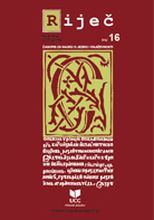SUKOB IDENTITETA U MANJINSKIM ZAJEDNICAMA: NA PRIMJERU ROMANA FIGA GORANA VOJNOVIĆA
CONFLICT OF IDENTITY IN MINORITY COMMUNITIES: THE EXAMPLE CASE OF GORAN VOJNOVIĆ'S NOVEL FIGA
Author(s): Tatjana Balažic Bulc, Vesna Požgaj HadžiSubject(s): Slovenian Literature, Migration Studies
Published by: Filološki fakultet, Nikšić
Keywords: identity; immigrants; minority communities; intercultural dialog; plurilingualism
Summary/Abstract: The paper has been, primarily, focused on ethnic and linguistic identity, as well as their reflection in literature. The author understands identity as a conception of oneself built in the context of a common identity, as a product of interaction between an individual and other members of the group., since it is composed of various elements that can be inherited (e.g. gender, race, age, ethnicity, etc.) or chosen by ourselves (e.g. occupation, political affiliation, etc.). In interactions with others, an individual decides which elements or identities are more important to us. Often our chosen or desired identities collide with the old, abandoned, disruptive identities, and, on the other hand, also struggle with coercive identities chosen by others. One such identity is ethnic, especially in the case of immigrant communities that are not positively accepted in the majority community, e.g. immigrants from the former Yugoslavia in Slovenia, thus the feeling of foreignness and noninclusion can become part of their immigrant identity, which is shown in the Goran Vojnović's novel Figa. The poignant sense of alienation runs from generation to generation, especially in the case of male characters. The reason for their alienation is, on the one hand, the feeling of being trapped in one's own ethnic identity and inability to adapt to the new community, and on the other hand, rejection or exclusion by the majority community. The article, also, highlights the plurilingual language practices that change in the novel according to the personal or social circumstances of members of different immigrant generations. Finally, the author emphasizes the importance of inclusion and the promotion of intercultural dialogue and plurilingualism in the Slovenian society.
Journal: Riječ
- Issue Year: 2019
- Issue No: 16
- Page Range: 49-68
- Page Count: 20
- Language: Montenegrine

